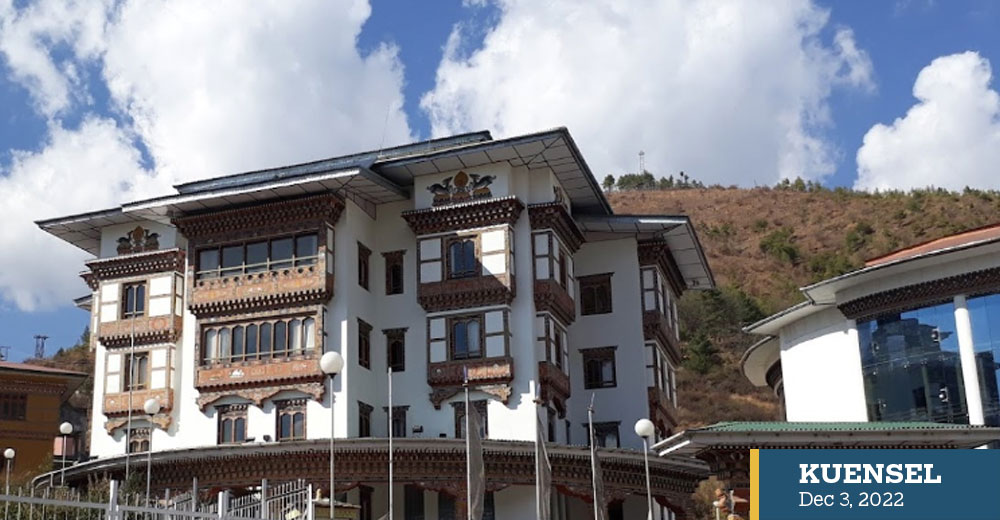Rinzin Wangchuk
Curbing corruption still remains a daunting task despite building an informed and awakened citizenry by engaging citizens and raising anti-corruption consciousness of public officials.
This is one of the key issues highlighted in the Anti-Corruption Commission’s (ACC) annual report 2021-2022. The report states that fighting corruption has become even more challenging and arduous with the increasing complexity of corruption cases due to the advancements in technology.
While it calls for collective efforts to prevent and combat corruption through a culture of integrity, fostering ethical business in the private sector and engaging civil society organisations (CSOs) and media, the most urgent and important need for effective and strong deterrence, ACC states, is through detection and investigation, probability of conviction, and severity of punishment. It also states the need for rigorous advocacy, promoting ethical leadership, expanding integrity in schools and training institutes etc.
“It requires not only a strong legal basis for the fight against corruption, but that resolute enforcement followed by effective adjudication. This virtuous cycle has to be underpinned by effective and efficient administration and good governance that allows no room or loopholes for corruption to breed and thrive,” the report stated.
HR challenges
Besides shortage of human resources, difficulties in attracting potential employees and retention of staff are major challenges the anti-graft agency is facing today. Over the past three and half years, 39 officials had left ACC. In just the first half of 2022, 12 officials left the commission. As of June 2022, there were 128 staff, out of which nine are on EOL or long term studies. The attrition rate has increased from 7.48 percent in 2021 to 7.89 percent in June 2022.
One of the main causes for staff leaving ACC, according to the report, is the work pressure and nature of work with the inherent risk of reprisal and social backlash in a small society, besides better remuneration elsewhere.
With the present HR attrition rate, workload on the existing staff has been escalating, especially on those involved with investigations. For instance, during the Phuentsholing Mini Dry Port (MDP) investigations in 2021, each investigator worked around 13 hours per day, including weekends for several weeks at a stretch. The Commission was able to assign only 17 complaints out of 57 qualified for investigation during the reporting period.
Despite the challenges, the ACC emphasis on expanding reach to create more deterrence and strengthen accountability, discipline, professionalism and integrity in the country. Three field offices were operationalised in Phuentsholing, Bumthang and Trashigang in April 2022 while the process of formalising Regional Offices was initiated in December 2021.
The commission continued to conduct various education programs for targeted groups from schools, colleges, tertiary institutes, private/ corporation sectors, civil society organizations, media, spiritual institutions, local governments and ministries through both virtual and in-person sessions.
They also conducted thematic sessions for the officials of the justice institutions and law enforcement agencies. Similarly, thematic sessions for the HR officers, Local Government (LG) engineers and newly elected LG leaders were also conducted.
The ACC also took up proactive investigation as well besides usual reactive investigation on cases. “As much ground as may have been gained in the last 16 years, there is a long way ahead of us and there is much to be done,” ACC stated.
ACC stated that the momentum in combating corruption must be bolstered for sustained and equitable development as Bhutan cannot afford to be complacent especially during these times of reform and transformation aimed at exponential growth, anchored safely by integrity.
Complaints
In 2021-2022, the ACC received 435 complaints with an average of about 36 complaints per month. It was an increase of 11 complaints from 2020.
As in previous years, webmail continued to be the most preferred mode to lodge complaints. ACC received 172 (40 percent) complaints via webmail. Walk-in complaint was the second preferred mode followed by postal. While social media means like WhatsApp and WeChat may be popular among the public, it has not been used widely for reporting corruption. Number of complaints reported via WhatsApp and WeChat dropped from 30 in 2020 to 14 in the reporting period.
For the first time in the history of the ACC, the number of known complaints surpassed the number of anonymous complaints. Of the 435 complaints received, 219 complaints were from known sources and 216 from anonymous sources. The rise in known complainant, according to the report, may be due to the increased awareness, trust and confidence in the ACC.


